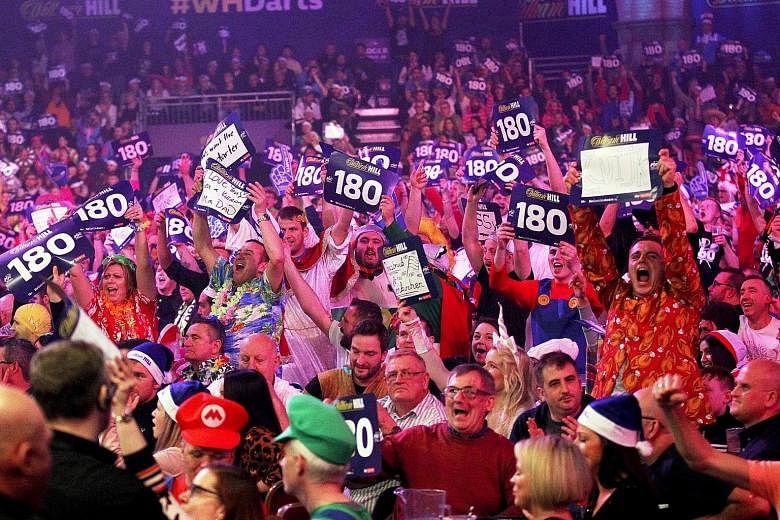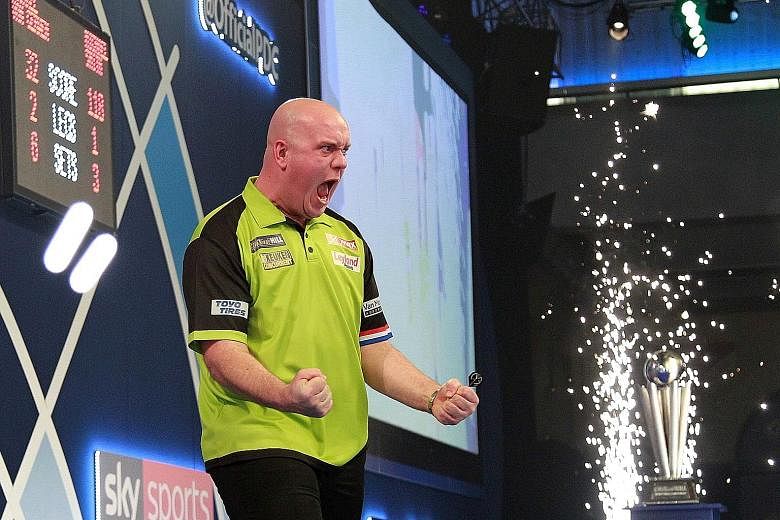LONDON • By conventional measures, darts players are not telegenic. They mutter to themselves onstage. They wear flamboyant polyester polos. They cradle their handful of tiny spears and stare a lot at a fibrous board 2.36m away.
But professional darts has catapulted itself from musty British pubs onto millions of television sets across Europe, an insurgency by a working-class sport that has turned the best of its mostly middle-age players into stars.
Its premier event, William Hill World Championship, has grown into a three-week affair with a £2.5 million (S$4.3 million) purse, replete with cheerleaders and thunderous walk-on music, and the sport's promoters work tirelessly to ratchet up the show.
One area of emphasis in recent years has been to encourage the players to show some emotion for the TV cameras, celebrate some after a big turn or win.
Though mild by the standards of other professional sports, the yelps and fist pumps and prancing are setting up a clash with some traditionalists. The dispute is all part of a makeover of darts engineered by Barry Hearn, the silver-tongued chairman of the Professional Darts Corp, or PDC, and the mastermind behind the sport's growth on TV.
"I talk to players: 'Do not be boring, remember the customer,'" he said.
"The guy that's watching on TV wants to know, are you happy when you walk on stage? If you look bored I've got no time for you.
"It's not WWE, because it's a real sport without any rehearsal."
For years, professional darts associations have tried to shed the game's links to the smoky pubs where it blossomed nearly a century ago. Beer has been banished from the stage. So have cigarettes.
Players walk to their places through cheering throngs of fans as a hand-picked song booms over the loudspeakers and the auditorium becomes bathed in cool, blue light.
At the recent World Championship at the Alexandra Palace in north London, it was as if a 3,000-member fraternity party was taking place in the same hall as a complicated tooth extraction.
Some players wear earplugs now to block out the pandemonium; even a moment of mugging for the crowd can throw an opponent off.
Take, for example, a first-round match played before fans dressed in all manner of full-body costumes: a Christmas tree, a giraffe, a duck and Woody from "Toy Story", not to mention a heavy-drinking bunch of priests and nuns.
Vincent van der Voort, a veteran Dutch player known for his quick-fire style, was up against Lourence Ilagan, a wiry Filipino with a relatively thin resume in major events.
The duo took turns throwing from behind a line known as the oche, with each successful shot pulling them closer to the goal of dropping from 501 points to zero.
Van der Voort was nonchalant, though his face grew redder and sweatier. Ilagan, on the other hand, strode around the stage, pumping his fist and once pausing, theatrically, to make a mean face, point a forefinger in the air and then jab it towards the ground.
Van der Voort eventually prevailed, but his opponent's showmanship proved a challenge.
"Once I was in a rhythm, I thought, 'I'm going to smash you, really, I'm going to smash you all over'," he said after the match. "Then he starts walking around and I couldn't get my rhythm going."
In any event, the PDC, which operates the biggest tournaments, has begun reviewing whether it needs more referees and a system for docking points during a match.
The only problem is no one seems to know what qualifies as excessive celebration. Several ex-players said, confusingly, that what mattered was not the manner so much as whether a player had earned one.
Hearn agreed. "If you've done something that's worth celebrating, that's not a problem," he said. "If you hit 26 with three darts and celebrate, you'll be in front of the disciplinary panel."
Over-celebrating, though, is hardly the only offence to have rocked the sport lately. Gary Anderson, a two-time world champion, was accused last month of passing gas so pungent it threw his opponent off. He even turned the blame on his opponent, leaning on the "he who smelt it dealt it" dictum.
The popularity of darts, like professional golf with Tiger Woods, has tended to rise and fall with the calibre and charisma of the top player.
The 1980s, another golden age for the sport, were dominated by Eric Bristow. Back then, almost all of the fans in attendance were amateur players themselves, said Keith Deller, a former world champion.
Currently, the darts world is dominated by Dutchman Michael van Gerwen, who many consider the best player ever, and who is known to play to the crowd.
But even the traditionalists give Hearn credit as well.
"Barry Hearn is the man," said van der Voort, "and if he likes it that everybody's over-celebrating or whatever they do, then everybody's going to do it."
NYTIMES


